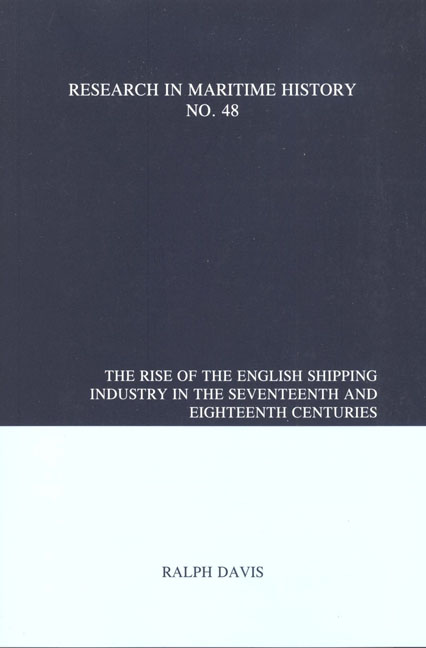Book contents
- Frontmatter
- Contents
- Introduction to the 2012 Edition
- Series Editor's Note
- Introduction
- Preface
- Chapter 1 The Widening of Horizons, 1560-1689
- Chapter 2 Consolidation, 1689-1775
- Chapter 3 Ships and Shipbuilders in the Seventeenth Century
- Chapter 4 Ships and Shipbuilders in the Eighteenth Century
- Chapter 5 The Shipowners
- Chapter 6 The Merchant Seamen
- Chapter 7 The Pay and Conditions of Merchant Seamen
- Chapter 8 Shipping Management and the Role of the Master
- Chapter 9 Shipping and Trade
- Chapter 10 The Nearby and Northern European Trades
- Chapter 11 The Southern European and Mediterranean Trades
- Chapter 12 The East Indian Trade
- Chapter 13 The American and West Indian Trades
- Chapter 14 The Government and the Shipping Industry
- Chapter 15 War and the Shipping Industry
- Chapter 16 Four Ships and Their Fortunes
- Chapter 17 Was It a Profitable Business?
- Chapter 18 Conclusion
- Appendix A A Note on the Shipping Statistics, 1686-1788
- Appendix B Sources for the History of the Shipping Industry
- Index
Chapter 2 - Consolidation, 1689-1775
- Frontmatter
- Contents
- Introduction to the 2012 Edition
- Series Editor's Note
- Introduction
- Preface
- Chapter 1 The Widening of Horizons, 1560-1689
- Chapter 2 Consolidation, 1689-1775
- Chapter 3 Ships and Shipbuilders in the Seventeenth Century
- Chapter 4 Ships and Shipbuilders in the Eighteenth Century
- Chapter 5 The Shipowners
- Chapter 6 The Merchant Seamen
- Chapter 7 The Pay and Conditions of Merchant Seamen
- Chapter 8 Shipping Management and the Role of the Master
- Chapter 9 Shipping and Trade
- Chapter 10 The Nearby and Northern European Trades
- Chapter 11 The Southern European and Mediterranean Trades
- Chapter 12 The East Indian Trade
- Chapter 13 The American and West Indian Trades
- Chapter 14 The Government and the Shipping Industry
- Chapter 15 War and the Shipping Industry
- Chapter 16 Four Ships and Their Fortunes
- Chapter 17 Was It a Profitable Business?
- Chapter 18 Conclusion
- Appendix A A Note on the Shipping Statistics, 1686-1788
- Appendix B Sources for the History of the Shipping Industry
- Index
Summary
The year 1689 marks a turning-point, not only in the growth of the shipping industry but also in general commercial development. This is not merely because it saw the outbreak of a costly war which was savagely fought, with a brief interruption, for nearly a quarter of a century. Long-term influences were also at work to restrict the expansion of English commerce, and these combined with new situations created by war and its aftermath to slow down the rate of development of the shipping industry. Probably no more than fifty thousand tons were added between 1689 and 1739 - a rate of increase of only a third of one percent per annum (compound); between 1572 and 1689 the addition had been nearly three hundred thousand tons, and though the period was more than twice as long this represents an annual increase of 1 Vi percent, fully maintained right up to 1689. Though wars had caused sharp setbacks there had been no long periods of stagnation, and in decades of peace the industry had bounded forward. By contrast, the size of the English merchant fleet stood still for over twenty years during the wars of William III and Anne, and made only limited progress during the ensuing twenty-five years of peace.
The reason why the shipping industry had grown rapidly during most of the seventeenth century was that a number of new branches of commercial activity were in early stages of development. The Mediterranean, colonial and Far Eastern trades had all been created out of nothing, and the Newfoundland fishery and the coal and timber trades from negligible beginnings, since 1560. All had extended to great size in the course of the sixteenth and seventeenth centuries, and in that first stage of development achieved rates of growth that could not be indefinitely maintained. By 1700, having matured, found and fully exploited their markets and spent the initial impetus of growth, they were employers of much the greater part of English shipping tonnage. The export trade which paid for these imports was also slackening its growth. The seventeenth- century expansion of imports had depended on the earnings of the developing export of woollen goods and of the new re-exports of colonial sugar and tobacco and Indian textiles.
- Type
- Chapter
- Information
- Publisher: Liverpool University PressPrint publication year: 2012



